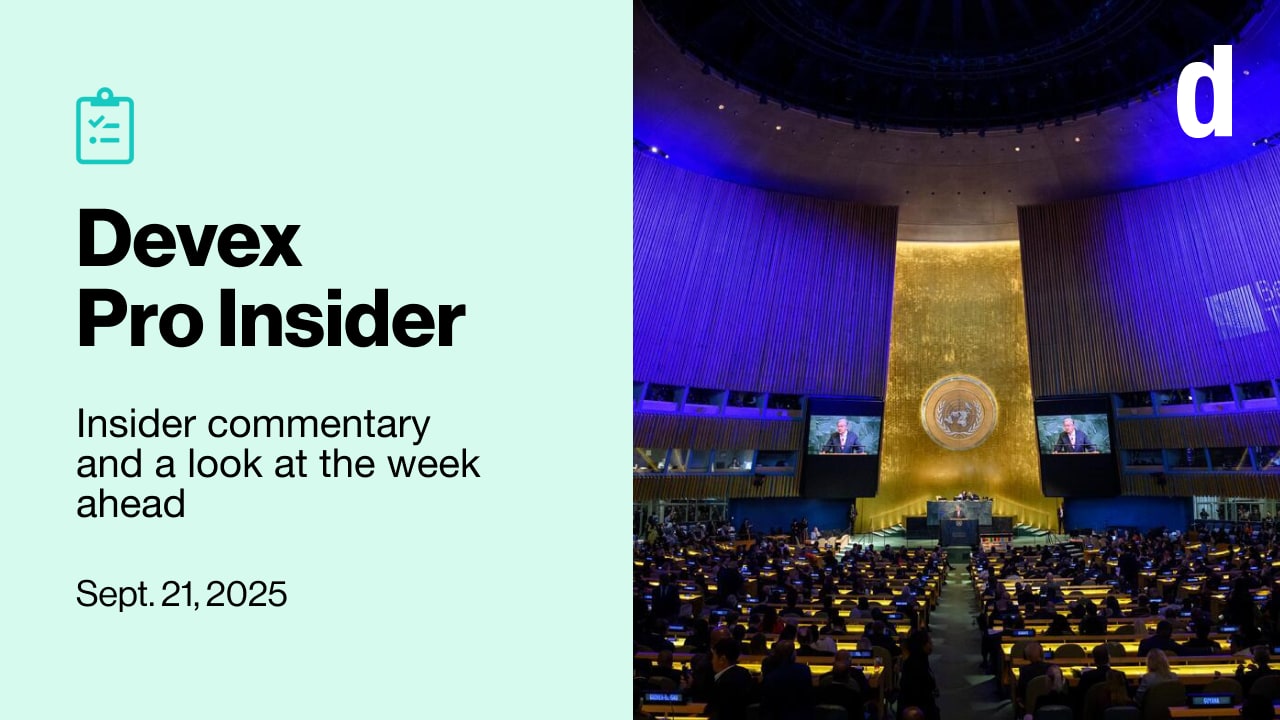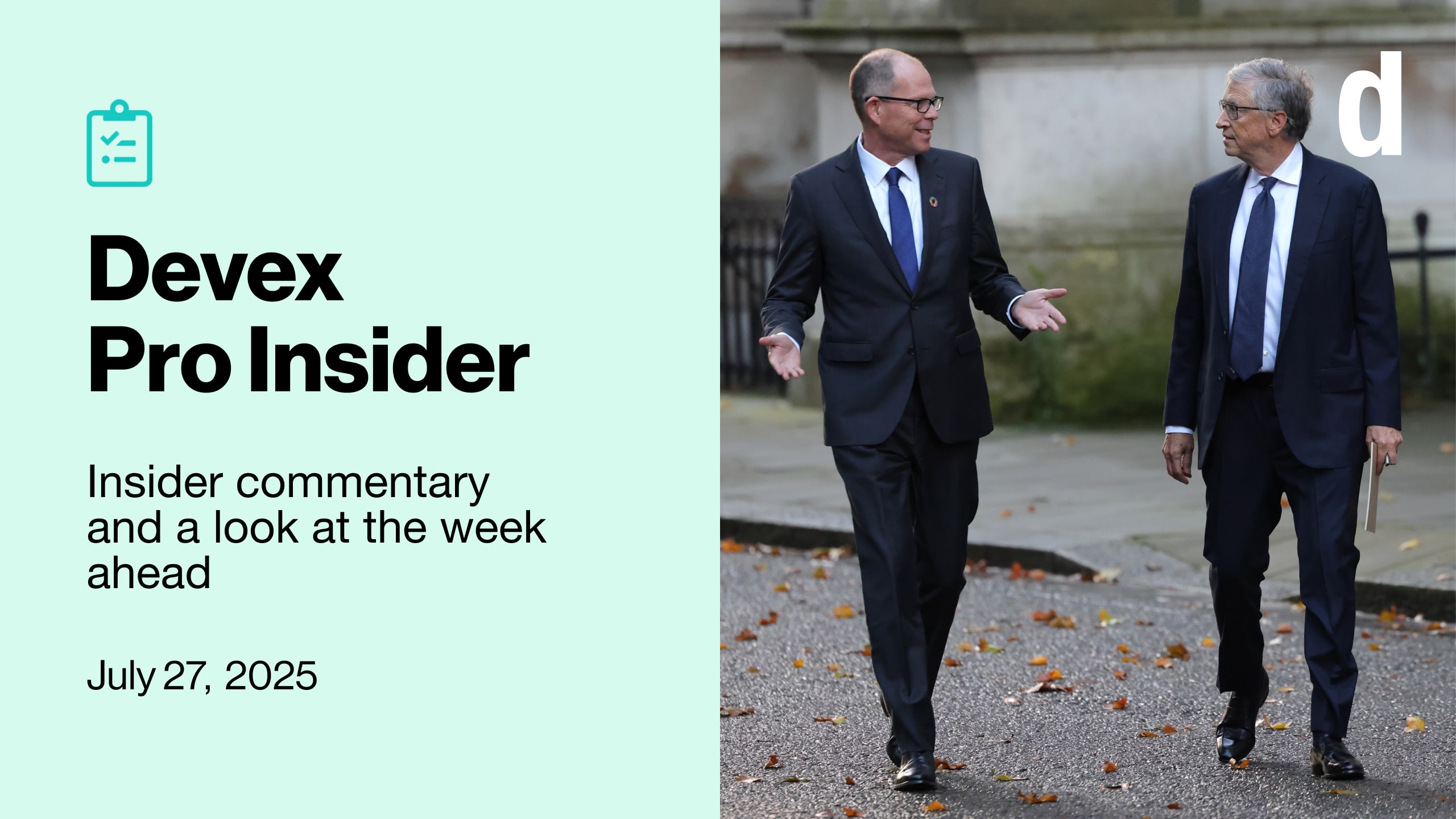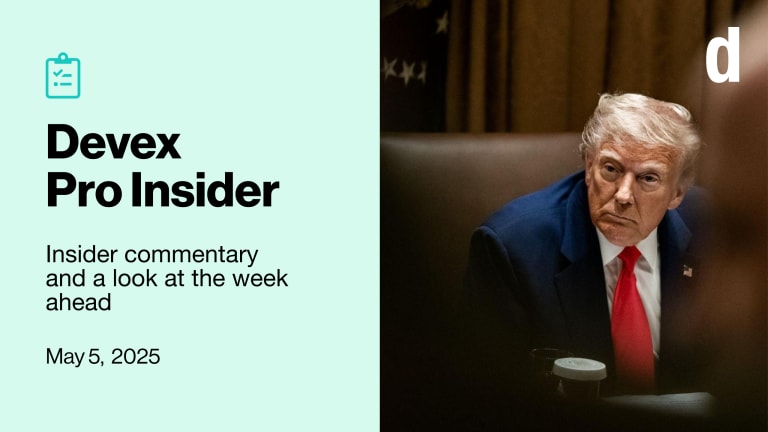Devex Pro Insider: The fight to save USAID begins
The lawsuits challenging the dismantling of USAID are beginning to be filed, with some already seeing some success. Plus, EU donors are missing in action, and how much the Gates Foundation has given in 25 years.
The fightback has officially begun. In the past week or so, several lawsuits were filed to challenge the dismantling of USAID, and there’s already been success. On Thursday, a judge ordered the Trump administration to reverse the funding freeze on existing programs. But much about how this will play out remains to be seen, and in the meantime, many organizations are struggling to hold out. We’ve already seen sizeable layoffs at Mercy Corps, the Norwegian Refugee Council, Catholic Relief Services, and even the U.N. migration agency. As Jim Richardson, who led the State Department’s Office of Foreign Assistance during the first Trump administration, said during a conversation with Devex Pro members last week: “This is certainly not the end of foreign assistance, or foreign aid, from the U.S. government. The courts are starting to weigh in, Congress hasn’t had its first hearing yet. … The question is whether the system will be irrevocably broken by then. I don’t know. I hope not.” We’ll be joined by legal expert Robert Nichols on Feb. 18 for a flash briefing with our Pro members to discuss the current state of play with the legal filings and what happens next. The next stages could be critical for the future of USAID so please do join us. Coming up: My colleagues are at the Munich Security Conference right now, which has started to draw in more of a global development crowd in recent years. Want to know what’s been happening there, and why the global development community should care? On Feb. 19, we’ll be catching up with Michael Werz, the North American representative for the conference, about the key takeaways and how shifting geopolitical tides are expected to affect development. Pro members are invited to join the conversation. Also in today’s edition: European and philanthropic donors are MIA, and Gates’ $100 billion. Bits and pieces All eyes were on Ukraine at this weekend’s Munich Security Conference — understandable given the vastly diverging views on how to handle (and hopefully conclude) the war with Russia. On one end of the spectrum you had U.S. Vice President JD Vance and U.S. Defense Secretary Pete Hegseth, who scolded Europe for its reliance on the United States for its defense needs instead of taking care of itself. Meanwhile, their boss, U.S. President Donald Trump, made it clear he was plowing ahead with peace talks, regardless of whether Ukraine was ready or not. On the other end of the spectrum was Ukrainian President Volodymyr Zelenskyy, who took the stage to rousing applause — as opposed to the awkward silences Vance and Hegseth inspired. “Ukraine will never accept deals made behind our backs without our involvement, and the same rule should apply to all of Europe,” Zelenskyy said. “A few days ago, President Trump told me about his conversation with [Russian President Vladimir] Putin. Not once did he mention that America needs Europe at the table. That says a lot.” But Zelenskyy, too, said Europe needs to do more to bolster its defense, floating the idea of an “armed forces of Europe.” Beyond defense, questions arose about whether Europe would also step up on the development front to fill the vacuum left by Trump’s foreign aid freeze. During one panel at the conference, European Parliament President Roberta Metsola acknowledged a surge in requests for EU assistance from international partners grappling with potential U.S. funding gaps. However, she was cagey about whether that assistance would be forthcoming, pointing out the necessity of reassessing how funds are allocated. “At the same time, we also have a counterdebate in the European Union. Is it also the time where we question our funding, how we have spent it, and where it’s gone,” she said. Metsola was actually speaking at a session on Venezuela’s political crisis, a sign of how the conversations and concerns about Trump’s foreign aid freeze have seeped into MSC panels. But there are plenty of other topics that have been addressed as well — from how lower-income countries can benefit from critical minerals without being exploited by the global north to the global gap in health security that could fan the flames of another pandemic. Check out all the highlights in our Munich diary. European leadership MIA. That’s one question I’ve addressed in this newsletter in recent weeks — whether European donors might step up to counterbalance what’s happening in the U.S. Last week, the head of one European aid agency came out with fighting talk. Jean Van Wetter, head of the Belgian development agency Enabel, wrote on LinkedIn that he had decided “to enter resistance mode … The richest man in the world [is] dismantling an agency that is aimed to support the poorest, right in front of our eyes. … This is against our values.” Addressing the European Commissioners for international partnerships and crisis management, he wrote: “Happy to discuss with you on how Europe can increase its support in reaction to this!” Unfortunately, his intervention came soon after Belgium announced it would be cutting its aid budget by 25%. Meanwhile, the rest of Europe has been keeping pretty shtum. Switzerland’s been busy slashing its own aid budget and cutting support to some U.N. agencies. The German development minister Svenja Schulze said what we all know, which is that, cuts or not: “Neither Germany nor the EU will be able to fill the gaps which might be left by the US, which is the world's largest bilateral donor.” Slow-moving beasts. Elsewhere, hopes have been on philanthropy, which did do some heavy lifting in the first few days of Storm Trump — such as Bloomberg Philanthropies’ pledge to fund the U.N. Framework Convention on Climate Change after Trump pulled out of the Paris Agreement. Since then, however, it’s all been rather quiet. Devex contributor Lauren Evans went in search of answers. She found that there has been some activity behind the scenes but that, for the most part, foundations were caught unprepared and unable to respond in a rapid way. Solange Baptiste, executive director of ITPC Global, which advocates for affordable health care in South Africa, likely spoke for many when she said she hoped such a catastrophic moment could ultimately lead to a sea change in the global financing architecture, but “To think that some philanthropy is going to come in and save us, or that another government, or bloc of governments, will come in to replace what the U.S. is doing, I think, is completely unfounded.” Rich in what? Philanthropy might not be able to replace U.S. public funding for development, but there is still plenty of money there. In an interview with the BBC earlier this month, Bill Gates revealed new numbers on how much his foundation has given since it was created in 2000 — and it’s over $100 billion. A previous update given in 2022 put the figure at less than $80 billion. And he added, “I still have more to give." Of course, Gates was once upon a time the richest person in the world, a position now held by Elon Musk, who doesn’t seem quite so philanthropically minded. ✉️ Do you have insights into any of this week’s bits and pieces? Let me know by replying to this email. Moving on Trump has chosen Gerald Parker to lead the White House pandemic office. It’s a rare bit of good news from the U.S. for the global health community: Parker is a veterinarian, was previously the associate dean for Global One Health at Texas A&M University, and has served as a health official under both Republican and Democratic administrations. Pathfinder International has named Tabinda Sarosh as its new CEO. Sarosh has worked at Pathfinder for a decade, most recently as interim CEO. Awo Ablo is the new president of programs and strategy at Co-Impact. Did we miss one? Is there a change on the horizon? Let us know at devexpro@devex.com. Up next Global gender rights. There’s not a lot on this week, but there’s one event I thought was worth mentioning because it centers on a theme that a lot of people are thinking about. The Commission on the Status of Women, the U.N.’s biggest annual event on gender equality, takes place next month — and given the current context it will undoubtedly be a tense one. In the lead-up to this, ODI Global and Equal Measures 2030 are holding what they describe as a “high-level public dialogue” to discuss: “Who will lead on gender rights on the global stage, and how can Member States improve their own multilateral coordination to counter backlash in a meaningful way?” Unfortunately, it looks like it’s in person only, in London. Feb. 18. Jobs of the week Your Pro membership includes access to the world’s largest global development job board. Here are some of the high-level opportunities currently available: • Country Director, Tanzania, Trees for the Future. • Strategic Programs, Associate Manager, Sustainable Agriculture Network. • Senior Program Officer, Enterics, Gates Foundation. Or search for more opportunities now.
The fightback has officially begun. In the past week or so, several lawsuits were filed to challenge the dismantling of USAID, and there’s already been success. On Thursday, a judge ordered the Trump administration to reverse the funding freeze on existing programs. But much about how this will play out remains to be seen, and in the meantime, many organizations are struggling to hold out. We’ve already seen sizeable layoffs at Mercy Corps, the Norwegian Refugee Council, Catholic Relief Services, and even the U.N. migration agency.
As Jim Richardson, who led the State Department’s Office of Foreign Assistance during the first Trump administration, said during a conversation with Devex Pro members last week: “This is certainly not the end of foreign assistance, or foreign aid, from the U.S. government. The courts are starting to weigh in, Congress hasn’t had its first hearing yet. … The question is whether the system will be irrevocably broken by then. I don’t know. I hope not.”
We’ll be joined by legal expert Robert Nichols on Feb. 18 for a flash briefing with our Pro members to discuss the current state of play with the legal filings and what happens next. The next stages could be critical for the future of USAID so please do join us.
This story is forDevex Promembers
Unlock this story now with a 15-day free trial of Devex Pro.
With a Devex Pro subscription you'll get access to deeper analysis and exclusive insights from our reporters and analysts.
Start my free trialRequest a group subscription Printing articles to share with others is a breach of our terms and conditions and copyright policy. Please use the sharing options on the left side of the article. Devex Pro members may share up to 10 articles per month using the Pro share tool ( ).
Jessica Abrahams is a former editor of Devex Pro. She helped to oversee news, features, data analysis, events, and newsletters for Devex Pro members. Before that, she served as deputy news editor and as an associate editor, with a particular focus on Europe. She has also worked as a writer, researcher, and editor for Prospect magazine, The Telegraph, and Bloomberg News, among other outlets. Based in London, Jessica holds graduate degrees in journalism from City University London and in international relations from Institut Barcelona d’Estudis Internacionals.








